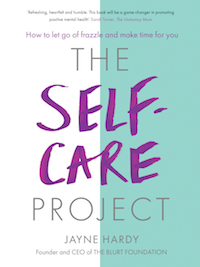Self-care is one of THE buzzwords of 2018, but if you have depression, it’s essential. Sufferer Jayne Hardy, author of new book The Self-Care Project: How to let go of frazzle and make time for you, cuts out the cliches to offer useful, realistic self-care tips to help depression
There’s no doubt about it, depression is a cruel illness; it gobbles us up, taints our thoughts and makes the things we take for granted when well, feel like herculean tasks. There isn’t an area of our lives that it doesn’t touch; how we feel about ourselves, our interactions with others, and our abilities to work, study and enjoy the things we once adored.
There’s a great deal of hoo-ha about this self-care malarkey at the moment, and for a good reason: it’s good for our health. Far from being a fad too, its teachings can be traced back to Ancient Greece where Socrates was all about ‘care of self’. Not in a selfish way either; self-care allows us to be the very best version of ourselves, which in turn allows us to properly care for those around us. Two things which feel completely unachievable when we have depression.
Make sure that you’re doing things for the right reasons; because they’re good for you and you want to, not because you feel you ought to.
Self-care and I haven’t always been so well-acquainted. We certainly haven’t always seen eye to eye either. I’ve sometimes put self-care on the backburner to come to realise that in doing so, I’ve been cutting my nose off to spite my face. You see, self-care sums up the actions, thoughts, and decisions, which allow me to be the best me I can be. It’s my strongest arsenal against depression and the more I learn about my needs, how to assert my boundaries, and to be mindful of what I’m saying ‘yes’ to, the more equipped I feel when depression comes a ’knocking. Yet, I still drop the self-care ball all the darn time which forces me to be more mindful than I am accustomed. It’s when I don’t pick it back up again that I find myself in hot water where my health is concerned, mental and physical health.
There are articles aplenty about the virtues of a bubble bath, of painting our nails, and of eating all the cake, but not so many which detail the simple acts we can do (even from our bed on the tough days) when depression is getting the better of us.
Here are some of my ‘emergency’ self-care things, for those times when it feels as though depression is winning the battle.
Say ‘yes’ more
Boundaries aren’t just about the things we say ‘no’ to; the ‘yes’s’ are as important. The emphatic all-in ‘yes’ to the things which light us up like a festive-fairy-light-laden-scene or to those offers of help with the camel-back-breaking-straws we carry.
It can feel just as icky, if not more so, to say ‘yes’ because the ‘yes’ often brings with it a dollop of self-doubt, the feelings of unworthiness, fear of failure, and the avalanche of guilt.
We’re just as worthy of those ‘yes’ things, and despite what the incessant negative thoughts say, we’re worthy of help too.
Lower the fortress walls
Boundaries can be of the fortress-type; they may well prevent us from getting too sucker-punched by life, but they can also be restrictive and claustrophobic.
We know when our boundaries are of the fortress type too because we feel misunderstood, lonely, disconnected and isolated from others. The walls we’ve built to protect us, to keep others at arm’s length, can also feel like the walls of a prison.
Depression holds us hostage enough without our boundaries being added to the mix. We can make small steps to let people in, not let depression be the ‘elephant in the room’ and seek connection – it’s one of our inherent needs.
Make sure we know the ‘why’
There’s a ‘why’ behind all that we do, and it’s important that we understand our ‘why’. We’re not always aware of it because much of what we do is on autopilot, but there is a reason in there somewhere; whether we were taught to do something a certain way, have learned from an example set to us, we’ve adopted them from someone else, we did our research, we want to…
Make sure that you’re doing things for the right reasons; because they’re good for you and you want to, not because you feel you ought to. When we do things because we feel we ‘should’ it tends to breed resentment, we feel as though we’re a ‘mug’ and we do that awful excuse-shuffle where we try to come up with the most realistic reason to bow out. Just bow out. We’re allowed to change our minds to align with our ‘why’s’.
Press pause
We flail about, rushing from one thing to the next, filling the awkward pauses with chatter, filling the not-awkward-pauses with scrolling. We never stop and sometimes, our minds and our bodies force us to – because they need us to stop. There’s power in the pause; it allows us to catch our breath, to hear the subtle cue our body gives us – those ever-so barely there aches/pains/hints that we don’t hear when we’re rushing around – and, to gain a different perspective on a situation.
When we go to bed feeling wired and tired, it’s often because our day didn’t have enough pauses. Our brain has had enough, it’s conking out, but before it can do so, it needs to digest the day’s events. Build in pauses, if only to give your brain a chance to catch-up with you.
Do the life admin
Some self-care is nourishing and comforting, while considerable chunks are downright boring. Boring self-care might include making that overdue doctor’s appointment, getting enough sleep, remembering to take your meds, calling a crisis team, brushing your teeth, tidying your home, sorting through your finances, applying for a job, eating a nutritious meal, arranging childcare, completing forms, making an uncomfortable telephone call, doing the laundry, taking a shower, asserting your boundaries, asking for help, etc.

When we have depression, any task feels mammoth. It feels easier to procrastinate, brush things under the carpet, or to try and forget about them but the very nature of this life admin stiff means they often act as preventative measures. When we neglect ‘life admin’ for a sustained period, we increase the risk of turbulence in our lives. Turbulence that ends up being much more difficult to deal with than the tasks would originally have been.
Nourish, not punish
Self-kindness is hard. It’s often so at odds with how we feel that it hurts to be kind to ourselves. But self-kindness is that micro-second choice between giving ourselves the benefit of the doubt, or falling into a routine of berating ourselves. It’s the difference between taking ourselves for granted or appreciating something, anything, about ourselves. It’s the difference between building ourselves up or knocking ourselves down. It’s being as kind to ourselves as we would be to a poorly toddler, showing that same grace, patience, and empathy.
Keep learning
Life is full of lessons, even if we don’t always see them as such; we learn something new every day about ourselves and the world around us. We don’t need to be afraid to ask questions, to delve deeper into topics which interest, and make steps towards dreams which pique our curiosity. Learning about depression too gives us a bit of power over it, it’s not in depression’s interest that we learn about coping techniques, mental health toolkits, nor self-care, so do it. Do it to sod depression and do it because you deserve better.
Face down resistance
When we go against the grain of what we’ve always done, there’s bound to be a switch in tempo and some resistance – if not from within, from others. You see, nobody likes change. Our brains don’t even welcome change; they prefer that we keep things nice and easy for them by doing what we’ve always done.
Change can be painful, it can be awkward, and it can be unsettling. But it can also bring with a promise of a better feel for life, and that’s to be embraced. Feel the resistance, see it for what it really is – our brains switching gears, splashed with a side of nerves – and do what you need to do, that’s different than before; for your health and happiness. Resistance fades with time.
Care-seek
Asking for help can make us feel all cringe-y. We don’t want to put people out. We don’t want to be a burden. And we sure as hell don’t feel worthy of help.
But we all need help at times.
When we’re reaching out and worried that we’re attention seeking, think of it this way, we’re care-seeking, and that’s a totally different thing altogether.

Listen to your gut
The expectations, the pressure, the ‘shoulds’, they don’t half weigh heavy. Whether they mean to or not, people project their expectations onto us, the peer pressure doesn’t ever really fade, and the ‘shoulds’ shackle us into doing what we think others want us to do – it seems so much easier just to follow suit.
We dance to other people’s tunes because we have done so for so long that we can barely hear ours anymore. Our tune is a whisper in the wind; it’s a subtle gut feeling, it’s the gentle pulling of the heart towards a different way.
Spend some time tuning into that beautiful tune of yours. It might take practice, you may feel uncertain, but the very least you deserve is the chance to be the captain of your own ship; you do get to set the pace and step out of the race.
Look back to learn, not to trip up
We all have a maelstrom of experiences, circumstances, choices, actions, people, and words, which have played a part in who we are and what we do.
Sometimes we look back, and in doing so, we stumble.
We stumble because the hurt can be heavy, the shame can sting. We stumble because we might be annoyed, frustrated, angry at what we did/didn’t do, said/didn’t say, what someone else did/didn’t do or said/didn’t say. We stumble because we know more now, than we did then, and we’d do it differently if only we could go back in time and do it all again.
When we look back and tie all of our mistakes, stumbles and bumbles, together into a broom with which to beat ourselves, we’re doing more harm than good. Doing so reinforces the negative thoughts we’ve already got zipping around, and can overshadow any good things we’ve done. The mistakes grow bigger, the good diminishes, and eventually, we start to believe that we’ve always been as useless, helpless, and unworthy as depression is telling us we are. It’s simply not true. We all haphazardly do things, because that’s how we learn. What we can do, is take those stumbling blocks and use them to build something better for our future selves. We can look back to learn, not berate.
We can look back to see how very far we’ve come despite, and in spite of, all of that stuff.
Hop inside your comfort-zone
There’s so much about depression that’s uncomfortable and downright painful – recovery means that we often spend a great deal of time outside of our comfort-zones. Which means when we do find things which bring us comfort, we’re likely to grab ’em with both hands and spend as much time as possible feeling comfortable and comforted. There’s an unadulterated magic which happens when we’re plonked right in the centre of our comfort-zones; it’s the ebb and flow – we have the chance to feel calmer, to digest the going-ons, to relax, to bask in the familiarity and to restore. Hop inside it whenever you need to.
Recharge when empty
There are times when our well runs dry; we’re depleted, we’re empty and have nothing left to give. It’s at this exact time, the guilt and frustration kicks in and rather than initiate emergency self-care mode, which is what’s needed at this point, we keep on keeping on, and we stutter, falter, and fill up with despair.
We can only refill when we stop to do so. Everything else can, and must, wait.

Accept ourselves, quirks an’ all
We’re not round pegs in square holes, because there is no square hole, not really. There are expectations, there’s peer pressure, and there’s a never-ending stream of social media updates showing us what everyone and their dog (yes, literally) are up to. We feel as though we ought to be fitting in, and keeping up. And when we’re consumed by illness, we’ve often lost a sense of who we are.
We feel as though our ‘quirks’ are negative aspects of ourselves because they set us apart from others, but that’s exactly why they’re so positive. We’re not supposed to be like everyone else. Step into who you are and be proud, you’re lovelier than you think you are.
Quieten the external chatter
What a noisy and boisterous world we live in. We’ve got alerts on our alerts, to-do lists that never seem to get ‘done’ and more ‘should’s’, ‘could’s’, and ‘ought to’s’ than we can shake a tailfeather at.
The external chatter can be intrusive, and it usually gets to us via our smartphones which flash/vibrate to let us know that someone, somewhere, wants our attention and they want it now.
Consider switching off all alerts – emails, social media, texts, voicemail, WhatsApp, etc. Rather than being demanded to check in because a flashing light/vibration tells us to, we can then mindfully check in when we choose to do so. It helps us to take back some control in a world where it’s easy to feel as though we don’t have any.

by Jayne Hardy, published by Orion Spring, is out now. Find out more at www.blurtitout.org @BlurtAlerts

READ MORE
Why depression is NOT all in your head
‘How I overcame my depression without medication’
Could video therapy help your depression?
17 healthy foods that fight depression
Like this article? Sign up to our newsletter to get more articles like this delivered straight to your inbox.





















































